中国社会科学院研究生院2018年
中国社会科学院大学中国社会科学院研究生院
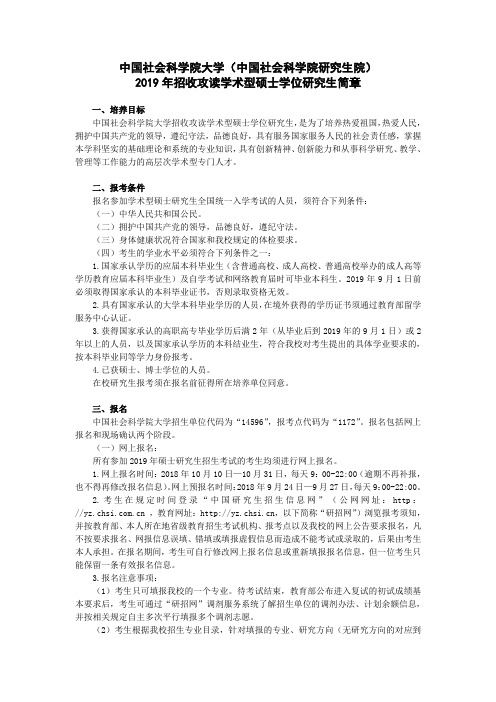
中国社会科学院大学(中国社会科学院研究生院)2019年招收攻读学术型硕士学位研究生简章一、培养目标中国社会科学院大学招收攻读学术型硕士学位研究生,是为了培养热爱祖国,热爱人民,拥护中国共产党的领导,遵纪守法,品德良好,具有服务国家服务人民的社会责任感,掌握本学科坚实的基础理论和系统的专业知识,具有创新精神、创新能力和从事科学研究、教学、管理等工作能力的高层次学术型专门人才。
二、报考条件报名参加学术型硕士研究生全国统一入学考试的人员,须符合下列条件:(一)中华人民共和国公民。
(二)拥护中国共产党的领导,品德良好,遵纪守法。
(三)身体健康状况符合国家和我校规定的体检要求。
(四)考生的学业水平必须符合下列条件之一:1.国家承认学历的应届本科毕业生(含普通高校、成人高校、普通高校举办的成人高等学历教育应届本科毕业生)及自学考试和网络教育届时可毕业本科生。
2019年9月1日前必须取得国家承认的本科毕业证书,否则录取资格无效。
2.具有国家承认的大学本科毕业学历的人员,在境外获得的学历证书须通过教育部留学服务中心认证。
3.获得国家承认的高职高专毕业学历后满2年(从毕业后到2019年的9月1日)或2年以上的人员,以及国家承认学历的本科结业生,符合我校对考生提出的具体学业要求的,按本科毕业同等学力身份报考。
4.已获硕士、博士学位的人员。
在校研究生报考须在报名前征得所在培养单位同意。
三、报名中国社会科学院大学招生单位代码为“14596”,报考点代码为“1172”。
报名包括网上报名和现场确认两个阶段。
(一)网上报名:所有参加2019年硕士研究生招生考试的考生均须进行网上报名。
1.网上报名时间:2018年10月10日—10月31日,每天9:00-22:00(逾期不再补报,也不得再修改报名信息)。
网上预报名时间:2018年9月24日—9月27日,每天9:00-22:00。
2.考生在规定时间登录“中国研究生招生信息网”(公网网址:http:// ,教育网址:,以下简称“研招网”)浏览报考须知,并按教育部、本人所在地省级教育招生考试机构、报考点以及我校的网上公告要求报名,凡不按要求报名、网报信息误填、错填或填报虚假信息而造成不能考试或录取的,后果由考生本人承担。
北方民族大学2018年公开招聘博士专任教师拟聘人员名单
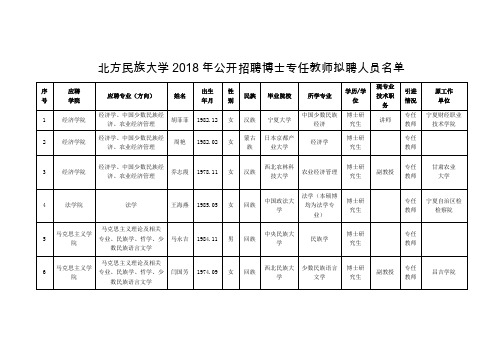
1979.02
男
回族
中国农业大学
农业水土工程
博士研究生
高级工程师
专任教师
宁夏水利水电勘测设计研究院有限公司
22
土木工程学院
土木工程、水利工程、环境科学、农业水土工程
陈美君
1977.07
女
汉族
上海师范大学
环境科学
博士研究生
高级工程师
专任教师
浙江省地质调查院
23
化学与化学工程学院
化学、药物化学
郭鑫
1991.01
2
经济学院
经济学、中国少数民族经济、农业经济管理
周艳
1982.02
女
蒙古族
日本京都产业大学
经济学
博士研究生
专任教师
3
经济学院
经济学、中国少数民族经济、农业经济管理
乔志霞
1978.11
女
汉族
西北农林科技大学
农业经济管理
博士研究生
副教授
专任教师
甘肃农业
大学
4
法学院
法学
王海燕
1985.05
女
回族
中国政法大学
北方民族大学2018年公开招聘博士专任教师拟聘人员名单
序号
应聘
学院
应聘专业(方向)
姓名
出生
年月
性别
民族
毕业院校
所学专业
学历/学位
现专业技术职务
引进情况
原工作
单位
1
经济学院
经济学、中国少数民族经济、农业经济管理
胡菲菲
1982.12
女
汉族
宁夏大学
中国少数民族经济
报考中国社科院在职研究生需要注意什么

报考中国社科院在职研究生需要注意什么?
近年,社科院作为我国高等教育的学院,受到广大在职人员的关注度越来越高。
作为在职研究生重点招生院校,可以看出,每年的报考人数都在不断增加,那么报考社科院在职研究生应该注意什么问题呢?
改革后,在职研究生的报考方式只有一月联考和五月同等学力申硕。
这里提一下,社科院在职研究生主要以五月同等学力的方式进行,每年的3月份报名,5月份考试。
考生需要注意的问题有:
1、学历、学位是否达到要求
考生必须是大学本科毕业,同时具有学士学位
2、年限是否达到要求
考生必须自获得学士学位证书之日起满三年。
3、是否达到中国社会科学院同等学力申硕考试资格要求
考生除了要满足上述证书和年限之外,还要满足院校对申硕考试的考生已修学分要求,一般要求是修满40分,考生达到要求之后院校会发放相应的考试资格卡,考生凭借资格卡报名参加考试。
中国社会科学院研究生院作为我国人文和社会科学学科设置最完整的一流研究生院,它的在职研究生是深受广大在职人员的欢迎。
有意向的考生要注意它的报考条件。
以上就是关于报考中国社科院在职研究生注意事项的解答。
希望对广大考生有所帮助。
如果您对报考在职研究生还有其他问题,可以咨询在职研究生考试网老师了解第一手在职研究生报考信息。
在职研究生信息查询入口。
2018年中国社会科学院博士学位入学考试英语A卷考博真题
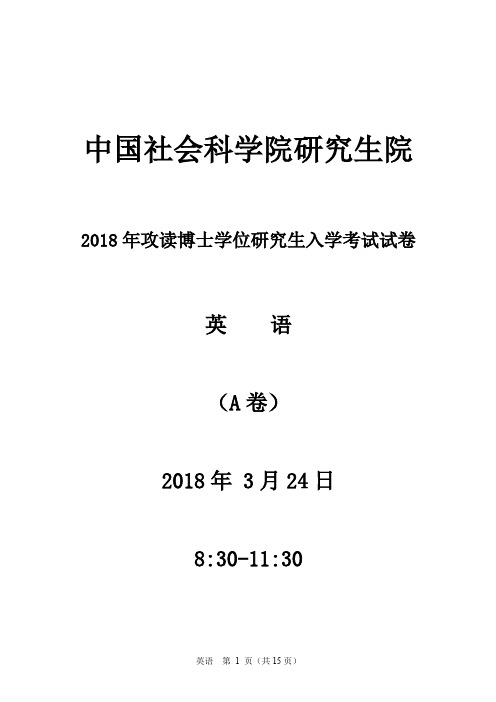
中国社会科学院研究生院2018年攻读博士学位研究生入学考试试卷英语(A卷)2018年 3月24日8:30-11:30答题说明1.请考生按照答题卡的要求填写相关内容。
在“姓名”一栏中,请用中文填写本人姓名;“试卷类型”一栏,本人无需填写。
2.在答题卡的“考生编号”一栏中填入本人的准考证号。
例如:考号为012345678900001,请考生在第一行中填写阿拉伯数字012345678900001,然后再将各栏中相应的数字涂黑,如下图所示。
如不涂满,计算机将识别为无效试卷。
3.在答题卡上填写答案时,请务必按照图示将选项格涂满;在A,B,C,D四个选项中,只有一个正确答案。
填写两个或两个以上答案,本题无效。
如需涂改,请务必用橡皮擦净后再重新填写。
4.试卷第三部分(包括7选5、概要)、第四部分(包括英译汉、汉译英),请考生直接写在英语试题答题纸上的指定位置,不再提供额外的答题纸。
请将以下题目的答案填写在答题卡上。
PART I: Cloze (20 points)Directions: Choose the best word(s) for each numbered blank.Every street had a story, every building a memory. Those 1 with wonderful childhoods can drive the streets of their hometowns and happily 2 the years. The rest are pulled home by duty and leave as soon as possible. After Ray Atlee had been in Clanton (his hometown) for fifteen minutes he was 3 to get out.The town had changed, but then it hadn’t. On the highways leading in, the cheap metal buildings and mobile homes were gathering 4 possible next to the roads for maximum visibility. This town had no zoning whatsoever. A landowner could build anything with no permit, no inspection, no notice to 5 landowners, nothing. Only hog farms and nuclear reactors required 6 and paperwork. The result was a slash-and-build clutter that got uglier by the year.But in the older sections, nearer the square, the town had not changed at all. The long shaded streets were as clean and neat as when Ray roamed them on his bike. Most of the houses were still owned by people he knew, or if those folks had passed on the new owners kept the lawns clipped and the shutters painted. Only 7 were being neglected. A handful had been 8 .This deep in Bible country, it was still an unwritten rule in the town that little was done on Sundays 9 go to church, sit on porches, visit neighbours, rest and relax the way God 10 .It was cloudy, quite cool for May, and as he toured his old turf, killing time until the appointed hour for the family meeting, he tried to 11 the good memories 12 Clanton. There was Dizzy Dean Park where he had played little League for the Pirates, and there was the public pool he’d swum in every summer except 1969 when the city closed it 13 admit black children. There were the churches—Baptist, Methodist, and Presbyterian—facing each other 14 the intersection of Second and Elm like wary sentries, their steeples 15 height. They were empty now, but in an hour or so the more faithful would gather for evening services.The square was as 16 as the streets leading to it. With eight thousand people, Clanton was just large enough to have attracted the discount stores that had 17 so many small towns. But here the peopl e had been faithful to their downtown merchants, and there wasn’t a single empty or boarded-up building around the square—no small miracle. The retail shops were mixed in with the banks and law offices and cafes, all closed for the Sabbath.He inched 18 the cemetery and surveyed the Atlee section in the old part, where the tombstones were grander. Some of his ancestors had built monuments for their dead. Ray had always 19 that the family money he’d never seen must have been buried in those graves. He parked and walked to his mother’s grave, something he hadn’t done in years. She was buried among the Atlees, at the far edge of the family plot because she had barely belonged.Soon, in less than an hour, he would be sitting in his father’s study, sipping bad instant tea and receiving instructions on exactly how his father would be laid to rest. Many orders were about to be given, many 20 and directions, because his father (who used to be a judge) was a great man and cared deeply about how he was to be remembered.Moving again, Ray passed the water tower he’d climbed twice, the second time with the police waiting below. He grimaced at his old high school, a place he’d never visited since he’d left it. Behind it was the football field where his brother Forrest had romped over opponents and almost became famous before getting bounced off the team.It was twenty minutes before five, Sunday, May 7. Time for the family meeting.1. A. praised B. celebrated C. blessed D. inherited2. A. roll back B. drive back C. go back D. think over3. A. excited B. hilarious C. numb D. anxious4. A. as loosely as B. as tightly as C. as firmly as D. as freely as5. A. adjoining B. hostile C. craven D. friendly6. A. documents B. ratification C. approval D. testimony7. A. a lot B. few C. a little D. a few8. A. abandoned B. lost C. shattered D. shunned9. A. but B. except C. besides D. rather than10. A. intends B. was intending C. intend D. intended11. A. dwell B. dwell on C. mull over D. sleep on12. A. at B. in C. of D. about13. A. instead of B. rather than C. instead D. in order to14. A. with B. over C. at D. beyond15. A. enjoying B. looking over C. competing for D. competing to16. A. lifeless B. boring C. null D. tedious17. A. wiped up B. wiped away C. wiped down D. wiped out18. A. to B. at C. into D. through19. A. assumed B. presumed C. alluded D. deluded20. A. declarations B. decrees C. depositions D. declinationsPART II: Reading Comprehension (30 points)Directions: Choose the best answers based on the information in the passages below. Passage 1LAPD Chief Charlie Beck's tenure has helped answer questions that lingered after the Rampart consent decree ended and outsider Chief William J. Bratton stepped down: Has L.A.'s policing culture permanently changed? Or with outsider chiefs and federal monitors gone, will the Los Angeles Police Department return to its brutal, secretive and racially-tinged past?A department veteran who, under Bratton's tutelage, became a true believer in data, transparency and change, Beck helped instill a more open, reform-oriented culture. He was successful in part because he's smart and his heart was in the right place, but also because he is old-school LAPD, son of a cop, sibling to and father of cops. His embrace of departmental reform in the post-Rampart era was a strong signal to the rank-and-file, to the city's political leaders and to communities that often suffered brutal policing tactics that the new thinking and new practices were there to stay.Beck announced Friday that he would step down in June, before the end of his second and final five-year term.Even though he is not elected, he is a savvy politician who correctly read what the mayor, the Police Commission and the people of Los Angeles wanted from him and what to an extent he was able to deliver: low crime, no scandals, little controversy. He became adept at the regular radio interview and the soundbite on immigration enforcement and criminal justice reform.At a time of national awakening and outrage over police shootings of unarmed AfricanAmerican men and boys, Beck and the LAPD often looked good in comparison, at least for a while.But there have been troubling exceptions. Just days after a police officer fatally shot Michael Brown in Ferguson, Montana., LAPD officers shot another unarmed African American man, Ezell Ford, in Los Angeles. Beck concluded that the shooting was justified despite his police commission's finding to the contrary. His action, and District Attorney Jackie Lacey's decision a year ago not to prosecute —along with numerous other officer-involved shootings —have exacerbated tension between the department and many of the communities it patrols.Beck's decision was to respond to an increase in violent crime in South Los Angeles with increased patrols and what amounts to an L.A.-style stop-and-frisk policy (automobile stops for arguably pretextual reasons such as broken taillights, in order to search for weapons).Did the tactic work? The violence eventually abated, but not before police reopened old wounds and reinvigorated anti-police sentiment in communities that felt over-patroled. Activists' calls for Beck's firing became a common feature at weekly commission meetings.Meanwhile, although Los Angeles continues to enjoy historically low crime rates, the declines began a slight but troubling reverse in 2015. The scandal-free ledger was tainted by the 2013 rampage of fired officer Christopher Dorner, who posted a manifesto of charges against the department, then killed four people and wounded three others before dying as police closed in on him. LAPD officers wounded three innocent bystanders in their sometimes frenetic quest to track down Dorner. There was a scandal of another sort when police cadets, aided by an officer, stole cruisers and other equipment. Their exploits went undetected for weeks.Beck earns high marks for managing an inherent tension faced in recent decades by every LAPD chief. In a city in which public safety accounts for more than 80% of the city budget, he faced strong pressure in City Hall and many communities to economize. At the same time, many of the same critics want him to provide better patrols in lower-crime parts of the city while still being able to respond in force to spates of violence in high-crime communities, and while employing a more community-oriented approach to policing citywide. Accomplishing all of those goals simultaneously is simply not possible.Beck is the fourth LAPD chief to be appointed under a key change that followed the 1992 riots, which were sparked by acquittals of officers in the brutal beating of African American motorist Rodney King. After decades in which chiefs could retain their jobs virtually for life, leaders of the department are now appointed to a single five-year term and can be appointed to a second — but no more. Chiefs Willie Williams and Bernard Parks were denied second terms. Bratton won a second but left early for other opportunities. Beck's June departure date leaves plenty of time for the commission and Mayor Eric Garcetti to consider a host of would-be replacements among the younger brass whom Beck has mentored.Comprehension Questions:21. To what extent has the Los Angeles Police Department changed under Beck?A. Permanently.B. Until he steps down.C. Not at all.D. Temporarily.22. Which of the following statements is NOT true?A. Charlie Beck’s protecting LAPD officers aggravated the re lationship between the departmentand the communities.B. Charlie Beck’s policy of increasing patrols and the stop-and-frisk policy have beencontroversial among the local people.C. Christopher Dorner was angry with the LAPD and abreacted his dissatisfaction by killinginnocent people.D. The LAPD will return to a brutal, secretive, and racially-tinged past after Chiefs WillieWilliams and Bernard Parks’ retirement.23. Why do you think activists' calls for Beck's firing became a common feature at weeklycommission meetings?A. He was maladroit in radio interview and the soundbite on immigration enforcement andcriminal justice reform.B. When Americans were outraged over police shootings of unarmed African Americans, LAPDunder Beck’s leadership did w ell.C. Beck earns high marks for managing an inherent tension faced in recent decades by everyLAPD chief.D. The increased patrol of the police aroused an anti-police sentiment in communities.24. Which of the following can be the last sentence of the passage?A. It's imperative that Beck's successor be someone who can build on his legacy and continuemoving the department down the path of reform.B. After announcing on Friday that he would step down in June before completing his secondterm on the job, Beck reflected on his LAPD career of more than 40 years.C. Charlie Beck, whose own career with the Los Angeles Police Department spanned four decades,will retire this summer, ending an eight-year tenure as police chief.D. Charlie Beck was credited with major reforms in the department and a general decline inhomicides but also had some missteps.25. What is the author’s attitude toward Charlie Beck as chief of Los Angeles Police Department?A. Cynical.B. Neutral.C. Prejudiced.D. Critical.Passage 2We are in a global health crisis, and it grows worse by the year, as the World Health Organization has warned that by 2030 almost half the world’s population will be overweight or obese if current trends continue. There are already 124 million obese children, a more than tenfold increase in four decades, and more than a million of these live in the UK, which has the worst obesity rates in western Europe. Four in five will grow up to be obese adults; and the leader of the UK’s paediatric body warns that this will cost them 10 to 20 years of healthy life.This is a social problem, both in cause and consequence, as concurred by Simon Stevens, the chief executive of the UK’s National Health Service, whose cautioning that obesity could bankrupt the health service comes across as the placard-wielding stance of a roadside prophet of doom - yet the government’s response has been as modest and inadequate as these figures are shocking. Medical experts describe its childhood obesity strategy as weak, embarrassing and even insulting. Though it inherited a tax on sugary drinks, it rowed back from restrictions on price-cutting promotions and junk food marketing or advertising, leaving its strategy to rely heavily on measuressuch as school activity programmes.Campaigners had warned that would not be enough; now research proves they were right –even when such initiatives tackle both diet and exercise, and make efforts to reach out to families. Children in schools in England’s West Midlands were given a year of extra ph ysical activity sessions, a healthy eating programme and cookery workshops with their parents, all of which failed to have any significant effect on children’s weight.The causes of the obesity epidemic are multiple and complex, as the landmark Foresight report produced over a decade ago underscored: we live in an obesogenic environment, and some more so than others (more than twice as many children in deprived areas are obese as in affluent areas). TVs and smartphones in bedrooms and reliance on cars play their part; so too do food deserts, where fruit and vegetables are expensive or inaccessible, which leaves the more economically strapped sector of the population choosing to fill a hungry child with donuts rather than apples.But one factor leaps out: greed. The problem is not gluttony by a generation of Augustus Gloops but the avarice of the Willy Wonkas who press junk food on consumers, then profess surprise at the results. The tactics of big food are, as the global health organisation Vital Strategies points out in its report Fool Me Twice, strikingly similar to those of big tobacco over the years. But big food has the advantage that everyone needs to eat, while no one needs to smoke, and that a biscuit does not damage health as a cigarette does, obesity notwithstanding. Thus, these companies tell us that we should not restrict individual freedom; that it is up to people to show self-discipline; and that their products are fine as occasional indulgences - never mind that they present family-size packs as if they are suitable for individuals, nor that highly processed foods, packed with salt and sugar, tend to be cheaper to produce, store and deliver – as well as being habit-forming.Other countries have been far bolder in tackling the industry, instead of relying on voluntary action. In Latin America, governments have forced companies to remove cartoon characters - naturally an instant appeal to young children - from cereal boxes, imposed junk food taxes and ordered school tuck shops to replace high-salt/sugar products with fruit and vegetables. Tougher rules reshape consumer perceptions and decisions and in doing so, they can also push companies into changing products.A ban on junk food advertising before the 9pm watershed is long overdue. It should be su pplemented by a ban on promotions and price cuts for “sharing” bags of chocolates, as Action on Sugar urged last month, and the sugar tax on drinks could be extended to food products, with the revenue channelled into initiatives making fresh produce more affordable and attractive to consumers. The government’s failure to force change means that the rest of us will pay the price –in ill health and higher taxes – as big food rakes in the profits.Comprehension Questions:26. Findings and studies demonstrate that________________.A. The obesity problem is largely a European oneB. Unhealthy children have unhealthy parentsC. There are more obese children in lower socio-economic areasD. People now are dying younger27. Who does the author believe to be primarily responsible for failing to stop obesity?A. Parents.B. Advertisers.C. Government.D. Manufacturers.28. Which of the following is NOT inferred in the passage________________.A. There are more obese children than adultsB. Obesity will drain funds from government resourcesC. Corporations do not care about obesityD. Lack of physical activity contributes to obesity29. Which ‘chain of events’ is indicated in the passage?A. New government laws →consumers buy different items →manufacturers change products.B. Manufacturers increase sugar content →more children buy products →life span isshortened.C. Regular exercise program →learning to cook own food →reduction in obesity.D. Television advertising is regulated →manufacturers lose revenue →product costs decrease.30. Company policy to manufacture family-size packs of unhealthy food while stating that it is theconsumer who is responsible for limiting what they eat is an example of________________. A. analogy B. rhetoric C. hypocrisy D. sophistryPassage 3The annual meeting of the World Economic Forum, (“WEF”) in Davos, Switzerland, was well under way when it officially commenced, early on a Wednesday evening in January, with an address, in the Congress Hall of the Congress Center, by Angela Merkel, the Chancellor of Germany. She had a lot to say about Europe. Some of it—“Do we dare more Europe? Yes, we do dare”—made the news. But outside the hall many Davos participants paid her no mind. They loitered in various lounges carrying on conversations with each other. They talked and talked—as though they hadn’t been talking all day. They had talked while sitting on panels or while skipping panels that others were sitting on. “Historic Complexity: How Did We Get Here?,” “The Compensatio n Question,” “Global Risks 2012: The Seeds of Dystopia”: over the course of five days, a man could skip more than two hundred and fifty such sessions.Davos is, fundamentally, an exercise in corporate speed-dating. “Everyone comes because everyone else co mes,” Larry Summers told me. A hedge-fund manager or a C.E.O. can pack into a few days the dozens of meetings—with other executives, with heads of state or their deputies, with non-governmental organizations whose phone calls might otherwise have been ignored—that it would normally take months to arrange and tens of thousands of Gulfstream miles to attend. They conduct these compressed and occasionally fruitful couplings, the so-called bilateral meetings, either in private rooms that the W.E.F. has set aside for this purpose or in hotel rooms, restaurants, and hallways. All that’s missing is the hourly rate.Many Davos participants rarely, if ever, attend even one. Instead, they float around in the slack spaces, sitting down to one arranged meeting after another, or else making themselves available for chance encounters, either with friends or with strangers whom they will ever after be able to refer to as friends. The Congress Center, the daytime hub, is a warren of interconnected lounges, cafés, lobbies, and lecture halls, with espresso bars, juice stations, and stacks of apples scattered about. The participants have their preferred hovering areas. Wandering the center in search of people totalk to was like fishing a stretch of river; one could observe, over time, which pools held which fish, and what times of day they liked to feed. Jamie Dimon, running shoes in hand, near the espresso stand by the Global Leadership Fellows Program, in the late afternoon. Fareed Zakaria, happily besieged, in the Industry Partners Lounge, just before lunch. The lunkers would very occasionally emerge from their deep holes (there were rumors of secret passageways) and glide through the crowd, with aides alongside, like pilot fish. (The W.E.F. says that Davos is an entourage-free zone, but this doesn’t seem to apply to the biggest of the big wheels, like heads of state.) It is said that the faster you walk the more important you are.It is a name-dropper’s paradise. Central bankers, industrial chiefs, hedge-fund titans, gloomy forecasters, astrophysicists, monks, rabbis, tech wizards, museum curators, university presidents, financial bloggers, virtuous heirs. I found myself in conversation with a newspaper columnist and an executive from McKinsey & Company, the management-consulting firm. This was serendipitous, as so many conversations in Davos turn out to be, because, at the urging of many, I was supposed to be angling for an invitation to the McKinsey party, at the Belvedere Hotel. A must, people said, with a glint. I was suspi cious, owing to an incongruity between the words “party” and “management consulting.” But this was Davos. The executive cheerfully added me to the list. A McKinsey for a Merkel: a fair trade.The newcomer hears repeated bits of Davos advice. Ride the shuttle: you might meet someone. Go to a session that deals with a subject you know nothing about: you might learn something. Come next year, and the one after, if they invite you back: you might begin to understand. Everyone says that you can’t get the hang of Davos until you’ve been three or four times. So many things are going on at once that it is impossible to do even a tenth of them. You could spend the week in your hotel room, puzzling over a plan, wrestling with your doubts and regrets, but a person who would do this is not the kind who would be invited to Davos.Another admonition: no matter how much you do, you will always have the sense that something else, something better, is going on elsewhere. On the outskirts of town, three men are hunched in the candlelit corner of a pine-panelled Gaststube, discussing matters of grave importance. You may think you don’t care about such things, but the inkling burrows like a tapeworm. The appetite for admittance can become insatiable. Whenever I passed through town, I noticed men in good suits and sturdy boots, walking with intent in the opposite direction. Where were they going? They ducked into tea shops or into Mercedes sedans with darkened passenger windows. “Wheels within wheels,” one woman whispered to me. “What happens in Davos stays in Davos,” many people said, but even when you’re there it’s hard to know what is happening in Davos. Yossi Vardi, an Israeli tech investor and an eighteen-year Davos veteran, said, “What you see here, in the Congress Center, is just twenty per cent of the action.”There are as many Davoses as there are perceptions of Davos. Schwab might use the term “stakeholders,” and the stakeholders may be partial to the word “silos,” but another term that springs to mind when you are there i s “cliques.” A certain ferment occurs where the cliques overlap, but as often as not they pass in the night.Comprehension Questions:31. The World Economic Forum (“WEF”) in Davos is a very important world event mainlybecause________________.A. The important lectures about world economic problems by world leadersB. People mingleC. Non-Governmental Organization can raise capital by meeting with governments andcompaniesD. World economic trends are established32. “Entourage free zone” is a very imp ortant characteristic of the WEF because_______________.A. Participants are free from companyB. Participants are free to exchange confidential business informationC. There are zones in WEF where everyone can freely attend to make business contactsD. None of the above33. When the writer describes the WEF as a “Name-Dropper’s Paradise”, the writermeans_______________.A. Participants can give their name cards to a lot of people to develop businessB. Participants can refer business contacts to other attendeesC. Participants easily meet other attendeesD. Participants can easily meet other participants through common business contacts34. The greatest fear of WEF participants is_______________.A. Not making enough business contactsB. Not being able to attend future eventsC. Being left out of the loopD. Giving out business secrets35. When participants attend the WEF they immediately fall into “cliques”. By “cliques” the writermeans_______________.A. Participants meet other participants that can bring business and can share valuable informationB. Participants meet other participants with shared values and interestsC. Participants meet other participants for a common causeD. Participants can meet other participants with different interests and valuesPassage 4A new degree of intellectual power seems cheap at any price. The use of the world is that man may learn its laws. And the human race has wisely signified their sense of this, by calling wealth, means - 'Man' being the end. Language is always wise.Therefore I praise New England because it is the place in the world where is the freest expenditure for education. We have already taken, at the planting of the Colonies, the initial step, which for its importance might have been resisted as the most radical of revolutions, thus deciding at the start the destiny of this country - this, namely, that the poor man, whom the law does not allow to take an ear of corn when starving, nor a pair of shoes for his freezing feet, is allowed to put his hand into the pocket of the rich, and say, "You shall educate me, not as you will, but as I will: not alone in the elements, but, by further provision, in the languages, in sciences, in the useful and in elegant arts. The child shall be taken up by the State, and taught, at the public cost, the rudiments of knowledge, and, at last, the ripest results of art and science".Humanly speaking, the school, the college, society, make the difference between men. All the fairy tales of Aladdin or the invisible Gyges or the taIisman that opens kings' palaces or the enchanted halls underground or in the sea, are any fictions to indicate the one miracle of intellectual enlargement. When a man stupid becomes a man inspired, when one and the same man passes out of the torpid into the perceiving state, leaves the din of trifles, the stupor of the senses, to enter into the quasi-omniscience of high thought - up and down, around, all limits disappear. No horizon shuts down. He sees things in their causes, all facts in their connection.One of the problems of history is the beginning of civilization. The animals that accompany and serve man make no progress as races. Those called domestic are capable of learning of man a few tricks of utility or amusement, but they cannot communicate the skill to their race. Each individual must be taught anew. The trained dog cannot train another dog. And Man himself in many faces retains almost the unteachableness of the beast. For a thousand years the islands and forests of a great part of the world have been led with savages who made no steps of advance in art or skill beyond the necessity of being fed and warmed. Certain nations with a better brain and usually in more temperate climates have made such progress as to compare with these as these compare with the bear and the wolf.Victory over things is the office of man. Of course, until it is accomplished, it is the war and insult of things over him. His continual tendency, his great danger, is to overlook the fact that the world is only his teacher, and the nature of sun and moon, plant and animal only means of arousing his interior activity. Enamored of their beauty, comforted by their convenience, he seeks them as ends, and fast loses sight of the fact that they have worse than no values, that they become noxious, when he becomes their slave.This apparatus of wants and faculties, this craving body, whose organs ask all the elements and all the functions of Nature for their satisfaction, educate the wondrous creature which they satisfy with light, with heat, with water, with wood, with bread, with wool. The necessities imposed by his most irritable and all-related texture have taught Man hunting, pasturage, agriculture, commerce, weaving, joining, masonry, geometry, astronomy. Here is a world pierced and belted with natural laws, and fenced and planted with civil partitions and properties, which all put new restraints on the young inhabitant. He too must come into this magic circle of relations, and know health and sickness, the fear of injury, the desire of external good, the charm of riches, the charm of power. The household is a school of power. There, within the door, learn the tragicomedy of human life. Here is the sincere thing, the wondrous composition for which day and night go round. In that routine are the sacred relations, the passions that bind and sever. Here is poverty and all the wisdom its hated necessities can teach, here labor drudges, here affections glow, here the secrets of character are told, the guards of man, the guards of woman, the compensations which, like angels of justice, pay every debt: the opium of custom, whereof all drink and many go mad. Here is Economy, and Glee, and Hospitality, and Ceremony, and Frankness, and Calamity, and Death, and Hope.Comprehension Questions:36. What is the passage mainly about?A. The power of human civilization.B. The relationship between man and nature.C. Man learning the laws of society.。
2016-2017年中国社会科学院研究生院2015年拟录取推荐免试生情况—新祥旭考研辅导

序号推免生姓名院系(教育中心)专业研究方向1丁韡外国文学系英语语言文学英美文学2石佳文学系中国现当代文学中国当代文学3茹克亚.吐尔逊少数民族文学系中国少数民族语言文学维吾尔族文学
4薛时蓉语言学系语言学及应用语言学语言类型学/汉语语法学5李慧语言文字应用系计算语言学语料库语言学6展可鑫历史系中国史元史7崔思朋清史8颜蕾世界历史系世界史北美环境史9朱容嬉考古系考古学夏商考古10江菲菲哲学系科学技术哲学科学哲学11李兆辰经济系西方经济学经济增长理论12翟天昶农村发展系
农业经济管理农产品市场13顾袁资源与环境经济14叶祖滔财经系
财政学
财税理论与政策15郭志昂金融学金融与服务经济16代阳阳国际贸易学国际贸易理论与政策17刘佳昊旅游管理
旅游经济管理
18谷雨数技经系数量经济学宏微观经济模型理论及应用19汪海建技术经济及管理经济体制改革与创新驱动发展20罗忆宁城乡建设经济系区域经济学住房保障与房地产管理21熊静雯社会学系社会学社会网络与社会社会支持22于晓敏新闻学与传播学系
新闻学广播电视新闻研究23于欢传播学
国际传播研究
24刘峰法律硕士教育中心
法律硕士(非法学)不区分方向
25肖亚26张轶男27毕克菲法律硕士(法学)
不区分方向
28陶宇涵29张丽同30赵宇31李茹社会工作硕士教育中心社会工作硕士不区分方向
32薛苗33林川琪34丁远金融硕士教育中心金融硕士不区分方向
35李晨光36唐李蕙37
卫思敏
38余智敏39孙一璐税务硕士教育中心
税务硕士
不区分方向
40张可娜41仝乐伟42郝俊如43陈林果文物与博物馆硕士教育中心
文物与博物馆硕士
文物鉴定与修复
44郭婳博物馆管理
45王珊46
赵墨。
中国社会科学院研究生院 2018 年博士招生专业目录
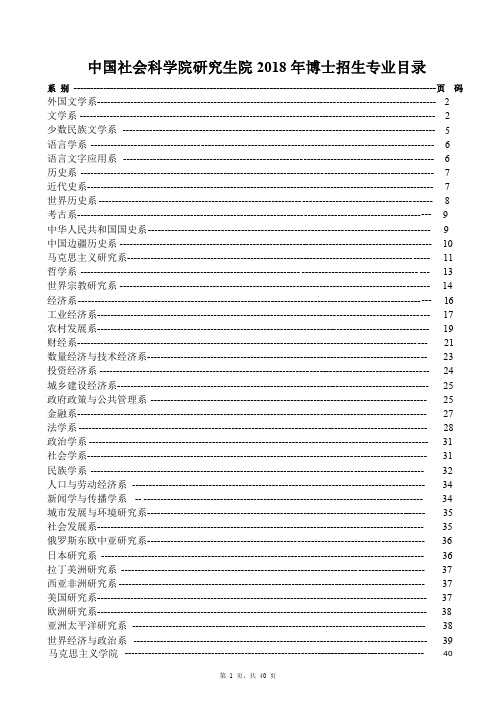
中国社会科学院研究生院2016-2017学年优秀研究生、优秀研
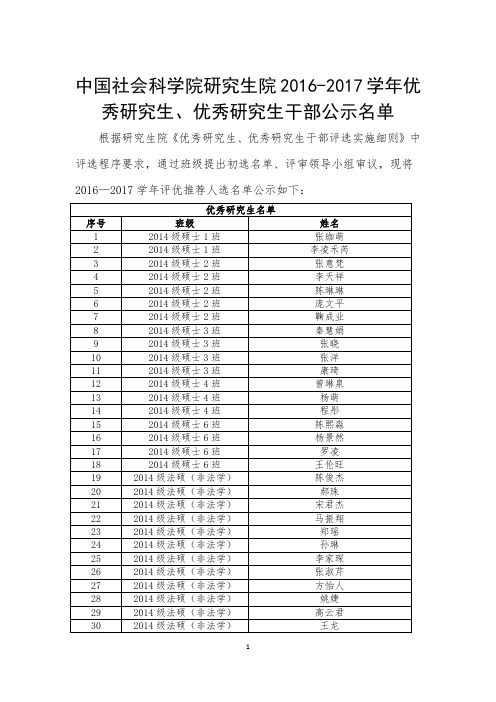
45
2014级博士3班
王宇
46
2014级博士3班
薛晓光
47
2014级博士3班
张丽丽
48
2014级博士6班
马永平
49
2014级博士6班
张力元
50
2014级博士7班
马凯
51
2014级博士8班
惠新华
52
2014级博士8班
毛文莉
53
2014级博士8班
陈玉博
54
2014级博士8班
陈旭
55
2015级硕士1班
2016级税务班
吕长生
276
2016级税务班
谢其梦
277
2016级税务班
韩金标
278
2016级税务班
付昭煜
279
2016级MSW(社工)一班
常潇
280
2016级MSW(社工)一班
焦思琪
281
2016级MSW(社工)一班
王亚欣
282
2016级MSW(社工)一班
王向聪
283
2016级MSW(社工)一班
王泽
管丽娟
293
2016级MPA一班
胡海波
294
2016级MPA一班
祁欣超
295
2016级MPA一班
王兆盼
296
2016级MPA一班
赵欣尉
297
2016级MPA二班
曹圣楠
298
2016级MPA二班
常远
299
2016级MPA二班
康慧鹏
300
2016级MPA二班
刘岩
301
2016级MPA二班
中国社会科学院研究生院课表
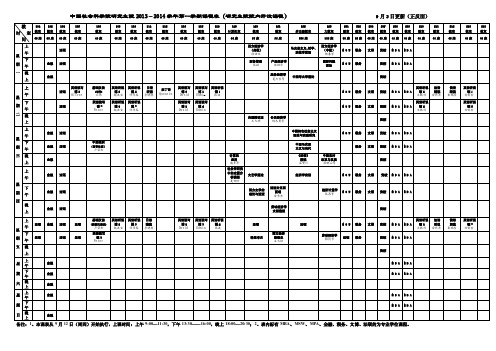
221 教室
96 座 146 座 120 座
法硕
法硕
222 教室
120 座
阶梯教室
上
法硕
午 星
下
期 午
法硕
二晚
上
上
M B A 法硕
午 星
下
期 午 M B A 法硕
三晚
上
上
M B A 法硕
午 星
下
期 午 M B A 法硕
四晚 上
上
M B A 法硕
午 星
下
期 午 M B A 法硕
五晚
上
上 午 星 期下 六午 晚 上
王铁利
党校
金融 法硕 金融 法硕 金融 金融 法硕 金融 法硕
中国概况 (留学生班)
卢荣和
中国特色社会主义 理论与实践研究
M S W 税务 文博 党校 M P A M P A
计算机 应用 赵丰年
社会学研究 中的定量分
析模型 夏传玲
文艺学通论
西方史学的 理论与流派
法国文化面 面观 余乔乔
中国马克思 主义与当代
法硕
(阅读与表达) 卢荣和
博8 赵洪宝
博7
精读
任华梨 李晓东
下
英语读写
期 午 法硕
法硕
法硕
博9
Peter
五晚
上
英语读写
博8
David
英语读写 英语听说
博7
博4
Edwin
张波
法硕 科技考古
西方经济 思想史 左大培
法硕
M S W 税务
劳动经济学
蔡昉等
法硕
税务
文博
党校 党校
MPA
- 1、下载文档前请自行甄别文档内容的完整性,平台不提供额外的编辑、内容补充、找答案等附加服务。
- 2、"仅部分预览"的文档,不可在线预览部分如存在完整性等问题,可反馈申请退款(可完整预览的文档不适用该条件!)。
- 3、如文档侵犯您的权益,请联系客服反馈,我们会尽快为您处理(人工客服工作时间:9:00-18:30)。
中国社会科学院研究生院2018年
接收优秀应届本科毕业生免试攻读硕士学位研究生的通知根据《教育部关于印发〈全国普通高等学校推荐优秀应届本科毕业生免试攻读硕士学位研究生工作管理办法(试行)〉的通知》(教学〔2006〕14号)、《教育部办公厅关于进一步加强推荐优秀应届本科毕业生免试攻读研究生工作的通知》(教学厅[2013]8号)、《教育部办公厅关于进一步完善推荐优秀应届本科毕业生免试攻读研究生工作的通知》(教学厅[2014]5号)及《教育部办公厅关于做好2018年推荐优秀应届本科毕业生免试攻读研究生工作的通知》(教学厅〔2017〕13号)的要求,并结合我院具体情况,现就我院2018年接收推荐免试生工作的有关事项通知如下:
一、申请条件
1.申请推荐免试攻读我院硕士学位研究生的人员,须符合以下申请条件:
⑴中华人民共和国公民。
⑵拥护中国共产党的领导,拥护社会主义制度,愿为社会主义现代化建设服务,有为祖国科学事业献身精神且有科研潜力,道德品德良好,遵纪守法,有理想,有抱负,刻苦学习,勤于思考,有创新意识。
⑶须为已取得推荐免试资格的2018年优秀应届本科毕业生。
⑷身体健康状况符合国家和我院规定的体检要求。
2.申请者须符合报考系对推荐免试生提出的相关学术要求。
二、申请程序
1.2017年9月28日开始申请人网上报名。
登录“全国推荐优秀应届本科毕业生免试攻读研究生信息公开暨管理服务系统”(以下简称“推免服务系统”网址:.cn/tm),填写
并提交信息。
2.2017年9月28日后,各系对申请者的网上申报信息进行初审和评议,确定复试名单并通知进入复试的申请者。
被通知复试的申请者须在复试前向报考系提交以下材料:
⑴《中国社会科学院研究生院2018年接收推荐免试攻读硕士学位
申请表》。
(见附件)
⑵本科阶段历年学习成绩单(须加盖推荐高校教务处公章)。
⑶网上报名时需要提交的相关表格。
⑷公开发表的论文、著(译)作。
⑸获奖证书。
⑹报考系要求的其他材料。
3.各系审核申请者提交的材料,确定其复试资格,组织复试。
4.政审、体检由各系在复试阶段组织完成。
5.2017年10月13日前,各系结束拟接收推免生复试。
6.2017年10月13日后,我院网站将公示各专业推荐免试生的接收情况(公示栏目:我院网站“2018年硕士生招生信息”)。
三、复试
1.复试内容:对申请者的学习能力、科研能力、创新精神和工作能力以及思想品德等诸方面进行全面考核。
2.复试形式:复试分笔试和面试。
3.复试分值:复试总分300分,合格线为180分。
其中笔试总分150分,合格线为90分;面试总分150分,合格线为90分,面试包括外语综合能力测试(含听力和口语),占50分。
四、接收
经我院批准接收的推免生的接收手续,由系秘书于10月13日前到招办统一办理。
五、联系方式
1.我院网站地址:。
2.我院地址:北京市房山区良乡高教园区中国社会科学院研究生院。
3.招生办联系电话:。
4.各系联系方式:请见我院网站—“招生信息”—“各系简介及通讯录”—“各系通讯录”。
六、特别说明
1.未经各系复试的申请者不予录取。
2.未经研招网“推免服务系统”报名的申请者不予录取。
3.入学前(2018年9月1日前)未取得本科毕业证书、学士学位以及受过处分或有学术不端行为的推免申请者不予录取。
4.在推免申请过程中弄虚作假、提供的材料不真实,一经发现,即取消其申请我院推免生资格;对已录取者,亦将取消其录取资格和学籍,并由我院按研究生管理规定进行相应处理。
5.申请者如对报考系的推荐免试工作提出异议,可向报考系复试考核小组提起申诉。
6.在2018年接收推免生工作中,如果教育部出台新的推免生招生工作要求,我院将做相应调整。
7.我院接收推免生的专业、方向和名额将在《中国社会科学院研究生院2018年硕士研究生招生专业目录》和《中国社会科学院研究生院2018年拟接收推免生专业目录》中公布。
中国社会科学院研究生院
招生办公室
2017年9月21日
附件:中国社会科学院研究生院
2018年接收推荐免试攻读硕士学位申请表
填表日期:年月日
可根据内容调整表格宽度,但全部内容不得超过2页,正反面打印。
